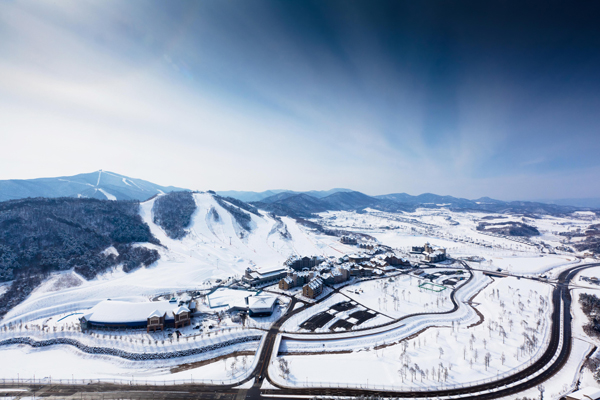 |
| Image courtesy Cuningham Group |
| Completed in 2009, the 1,240-acre Alpensia resort features 1,000 hotel rooms and facilities for winter sports, including a 15,000-seat ski jump stadium. |
The decision this month to award Pyeonchang, South Korea the right to host the 2018 Winter Olympics has put a spotlight on the U.S.-based architecture firm Cuningham Group.
In 2004, the Minneapolis firm, which has an office in Seoul, was hired by a South Korean government agency to design a resort for a mountain valley in Pyeonchang in order to prep the region for a bid for the 2014 Winter Olympics.
The $1.4 billion project, completed in 2009, transformed potato fields into a Bavarian-themed cluster of hotels, restaurants, and shops across a barbell-shaped 1,240-acre tract. But in the end, the Games went to Russia.
Still, the resort, whose name is Alpensia, likely was a factor in the International Olympic Committee’s decision to go with South Korea this time around, which pleases Jim Scheidel, a Cuningham principal. “It’s a deferred success,” says Scheidel, adding that, “the atmosphere we created I’m certain played some part in Korea’s winning the competition.”
In addition to summer attractions like a 27-hole golf course and mountain bike trails, Alpensia includes facilities for snowboarding, cross country skiing, and ski jumping, plus 1,000 hotel rooms.
Still, the resort, which will be about an hour from Seoul once a high-speed train is built, will need dorms for athletes and space for the media, according to Scheidel. The firm has not yet been approached about expanding the property.
Cuningham, a 43-year-old firm, has designed a number of resorts, such as the Isleta Casino in Albuquerque and Harrah’s Cherokee Casino in North Carolina.
South Korea, which beat out Germany and France for the 2018 hosting rights, previously failed in its bid for the 2010 Winter Games. The country did, however, host the Summer Olympics in 1988.

Post a comment to this article
Report Abusive Comment